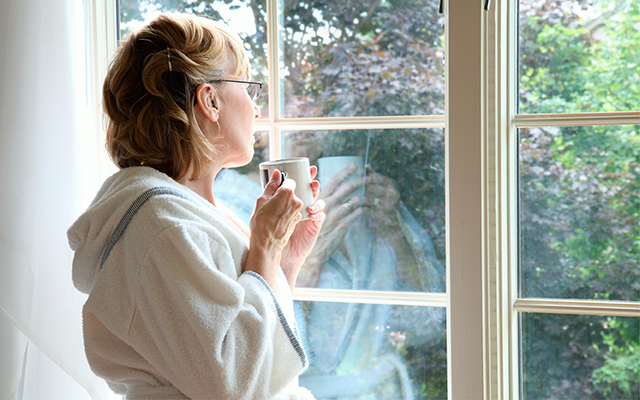For quite a bit longer than the 15 or so years My Lovely Wife has been trapped in menopausal limbo, scientists have been trying to figure out whether this biological onslaught of hot flashes and sleep disruption makes women older or whether it’s the simple act of aging itself that brings on the heat. Now researchers at UCLA say they’ve found the answer.
“It’s like the chicken or the egg: Which came first?” says Steve Horvath, PhD, a professor of human genetics and biostatistics at UCLA. “Our study is the first to demonstrate that menopause makes you age faster.”
Horvath and his team measured the biological age of 3,100 women by tracking methylation and analyzing DNA samples from four major studies, including the 15-year Women’s Health Initiative, which looked at mortality rates and quality-of-life issues in postmenopausal women. They concluded that menopause increases the rate of cellular aging, on average, by 6 percent. “That doesn’t sound like much, but it adds up over a woman’s lifespan,” says Horvath.
A woman who enters menopause at 42, for example, would be the equivalent of 51 years old eight years later — a full year older than someone whose first hot flashes had her tearing off her sweater at 50. “On average, the younger a woman is when she enters menopause, the faster her blood ages,” explains the study’s lead author, Morgan Levine. “This is significant because a person’s blood may mirror what’s happening in other parts of the body, which could have implications for death and disease risk.”
But it’s not those hot flashes that age you — at least not directly. It’s the lack of shuteye.
Menopause and Sleep
In a related study, Judith Carroll, PhD, an assistant professor of psychiatry at UCLA, found that menopausal women tended to sleep more poorly than average, a pattern that makes them old before their time. “Not getting restorative sleep may do more than just affect our functioning the next day; it might also influence the rate at which our biological clock ticks,” Carroll explains. “In the women we studied, those reporting symptoms such as restless sleep, waking repeatedly at night, having difficulty falling asleep, and waking too early in the morning tended to be older biologically than women of similar chronological age who reported no symptoms.”
I have been a mostly innocent bystander to MLW’s menopausal adventure, which began in her mid-40s and seems to be going strong well into her 60th year. It has produced a closet-full of sleeveless tops and easily shed cotton sweaters as well as a sleep pattern that is about as predictable as the Chinese stock market. Unlike her husband, who once dozed through a minor earthquake in central Greece, MLW has always been a light sleeper. Menopause just made a good night’s sleep a bit harder to come by.
Is she aging prematurely as a result? Despite its findings, the UCLA researchers admit the study isn’t really conclusive. And even if it were, I doubt it would have any effect on the way MLW navigates this particularly lengthy chapter in her life. When she needs a nap, she takes one. When the heat flashes, she just peels off her sweater.

This Post Has 0 Comments